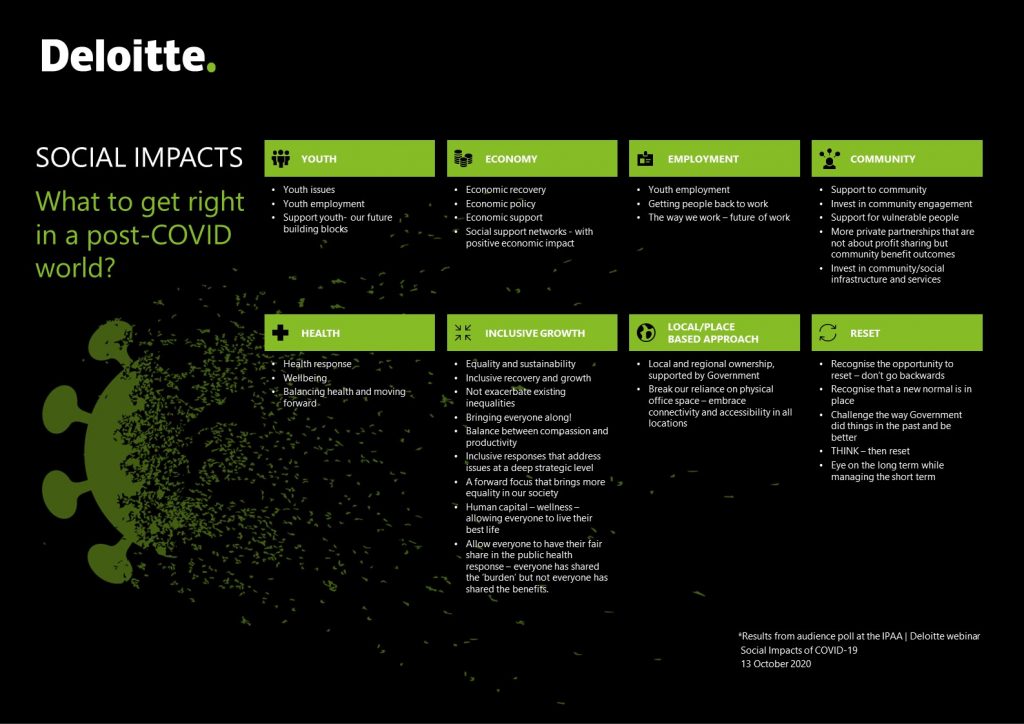THE SOCIAL IMPACTS OF COVID-19: LET’S PRESS RESET, NOT RESTART – WEBINAR WRAP-UP
The economic challenges of COVID-19 are deep and broad and include negative changes in many important social indicators (e.g. mental health, domestic and family violence). Yet it’s not all bad news as we’ve also observed greater social connectedness and community spirit along with exciting innovations in technology.
How well prepared are we to curb the negative effects of COVID-19 AND harness the positive effects to deliver better social outcomes for a more civil society?
On 13 October, Deloitte and IPAA Queensland’s hosted the first event in our Future of Government Series – The social impact of COVID-19: Let’s not just press restart, let’s press reset – with over 100 tuning in for what was a lively, insightful and thought-provoking discussion on this important public purpose topic.
The webinar featured an interactive panel discussion with speakers from the business, government, community and university sectors examining the social impacts of and responses to COVID-19 across some key policy areas.

Superbly moderated by Michael Kissane (Deloitte), the panellists shared their perspectives on what the impacts of the pandemic mean for policy design and service delivery models to build a more socially and economically inclusive Australia.
Panellists:
Natasha Doherty (Deloitte)

Michael Hogan (QUT Centre for Justice)

Belinda Drew (Community Services Industry Alliance)

Some excerpts from the webinar –

Setting the scene for the discussion, Dr Pradeep Philip (Deloitte)
shared his insights on the economic outlook – The world is in the single biggest synchronized recession ever faced, with about 90% of economies in recession simultaneously. Borders have shut, global supply chains have been broken and insidiously nationalism is on the rise.
In Australia? Economic growth has screeched to a halt and unemployment has shot up significantly with young people, older people and women losing out disproportionately. Unemployment has also gone up where it was already high, making more difficult the social issues we are already confronting. In Queensland it’s no different.
The bottom line is this. We’re actually facing structural change not a cyclical event. Therefore, we need structural answers. And these answers are that we need reform of both capital and labor, focusing on productivity, new business formation, participation and innovation.
Given that the pandemic is having disproportionate effects on the most economically vulnerable segments of the population (lower income households, workers with lower educational attainment, minorities, immigrants and women) and that economic activity is likely to remain subdued until the health risks abate, policymakers should refrain from withdrawing policy support too quickly and preserve spending on social safety nets.
Natasha Doherty
Societies have really grappled with the different approaches to addressing COVID-19 and with varying degrees of success. Yet that success doesn’t just sit in the hands of government, it’s also the actions of communities, our culture and business that shape our trajectory.
Referring to the recent research undertaken by Deloitte, Natasha outlined some of the negative and the positive impacts of COVID-19.
We need to continue to understand and monitor these effects, both the positive and negative, and use these outcomes to inform our long-term policy responses. We can’t lose sight of the social impacts and ensure that the decisions we make today during this recovery phase, leverage the social gains that we’ve observed but also protect those that are most at risk. And maybe also we need to change our collective understanding of how we as individuals and society contribute to building a better future.
On vulnerable groups, one of the examples shared – child protection. Evidence from previous pandemics tells us that the risks faced by children in out-of-home care or in child protection are exacerbated by disease protection measures. COVID-19 has meant that vulnerable children have less access to adults outside their home environment such as teachers or social workers and to safe places such as schools. The isolation creates increased risks, e.g. neglect and family violence. Those involved in supporting at-risk children will need to have short-term plans to shift to virtual delivery and longer-term plans to manage a potential ongoing increase in need for their services. From our discussions with providers, there is emerging evidence of a sharp rise in demand for services, and also the need to rapidly adapt to support children and their families.
Participants also contributed their thinking to the discussion –

Michael Kissane
Queensland has a strong track record in ‘response and recovery’ to challenges of natural disasters but of course COVID is a different challenge. What are your views on the responses to date?
Michael Hogan
Queensland has seen a robust public purpose response across sectors. The response from social services, from government agencies and importantly, cooperation and assistance from citizens in terms of their response to the pandemic. So the response has been big and bold as it needed to be.
We’re now pivoting to recovery but not really dealing with the structural reform and the disproportionate impacts on women, children, and young people from the pandemic-induced recession (of which Pradeep and Natasha spoke) – I don’t think we’ve seen enough yet of the structural reform that deals with pre-existing weaknesses in those systems, particularly in our care systems.
There’s now big debate and push for reform in early childhood, in social and affordable housing, in aged care and these are unfinished business and will be critical to an effective recovery – to reduce the impacts, to speed up the fair and positive response in communities and enable people to get their lives back on track.
Michael Kissane
How can we take advantage of the impetus to change the way we deliver community services with consideration that COVID-19 hasn’t just exacerbated for what were already vulnerable cohorts bit given rise to new groups of vulnerable people?
Belinda Drew
This is a disaster that’s slightly unusual because the health impacts of the pandemic go on whilst we are pursuing recovery, so we have this duality that we don’t often see … to manage this rolling ongoing set of impacts at the same time as we try to find a way towards a new normal. This colours the way community services ought to look at what Pradeep describes as an extraordinary reform opportunity, a burning platform.
There are three things that are important for the community services sector:
- To take the opportunity to be a player in the sorts of economic gains that we might take out of this disaster, particularly for community services in the space of productivity.
- To take the opportunity to genuinely look at structural reform across the community services industry, that speaks to efficiency and effectiveness, a topic that the industry hasn’t taken up with great vigour before.
- Actively renew the traditional role of community organisations at a local level in responding to new and emerging needs coming forward in local communities across Queensland, to think about how to shift the narrative of community services away from welfare responses to focus much more on prevention, early intervention, and the social and economic inclusion of people. So not to build out of COVID a new class of welfare dependent people, but instead reconnect and lift them back up again out of the immediate impact so they can live the lives they want.
There’s a real opportunity for the community services sector to reset, and I’m optimistic about the possibilities.
On where the catalyst for structural reform is coming from –
Michael Hogan
I see the catalyst coming from a range of sectors and we should not expect government to lead in this space. We’ve seen leadership already from the community services sector, from the philanthropic sector, from educational institutions and from business and industry.
Participants again contributed their thinking to the discussion –

Speakers spoke to the following issues as essential for short and long-term recovery:
- Structural reform of social policy and services, NDIS demonstrates it’s possible
- Sustained investment in human capital development across the life stages
- Continued adaptability and resilience across all sectors
- Recognition of the role of community services to support economic development
- Role of place and community leadership in the long-term recovery from COVID
- Bringing vulnerable communities comprehensively into the centre of planning, to empower them to be less reliant on formal support over time.
On the most important thing to get right in a post-COVID world –
Natasha Doherty
A focus on youth. From an economist’s point of view, they start with lower employment opportunities already and then look ahead to the next decades and see slow wage growth so what’s their future? Young people are in a highly disadvantaged situation – it’s harder to get your first job, harder to get into housing market, harder to build wealth. We need to give a stronger voice to our young people, to uncover the issues that matter for them and allow them to drive some of the solutions.
Belinda Drew
A revolution in the focus and purpose of community organisations, and the strong shift towards a leadership role on the economic settings that focus on inclusive growth. There’s a role for community organisations to play in this debate.
Michael Hogan
A focus on place. The impacts of COVID are being experienced differently across the state and country, from place to place. We can do better inclusive growth with a place-based approach. Let’s task our regional and district bodies to drive an inclusive growth and a social and economic development agenda. To devise local initiatives, local infrastructure, local priorities that really engage these communities and enable community leadership and bring local people into the solutions at a local level.
Go Youth, Go Care, Go Local!
And participants also responded to “what to get right in a post-COVID world?:”

To read more about the social impacts of COVID-19 and the opportunities to harness the positive effects and curb the negative, download a copy of Deloitte’s recent report – CLICK HERE
About IPAA Queensland
IPAA Queensland advances the professionalism, capability and integrity of public administration and public purpose work and promotes pride in service.
If you’re a public servant or engaged in public purpose work, we encourage you to get to know and connect with IPAA Queensland. Find out more about us by reading more on our site or through joining as a member here.
Build connections. Challenge your thinking. Keep informed. It’s your IPAA.
